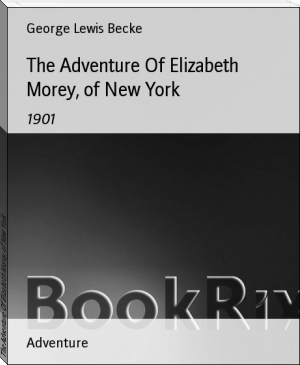The Adventure Of Elizabeth Morey, of New York - George Lewis Becke (ebook pdf reader for pc .txt) 📗

- Author: George Lewis Becke
Book online «The Adventure Of Elizabeth Morey, of New York - George Lewis Becke (ebook pdf reader for pc .txt) 📗». Author George Lewis Becke
In the sea story of Australia, from the days of Captain Phillip in 1788, to the end of the "fifties" in the present century, American ships and seamen have no little part. First they came into the harbour of Sydney Cove as traders carrying provisions for sale to the half-starved settlers, then as whalers, and before another thirty years had passed, the starry banner might be met with anywhere in the Pacific, from the sterile shores of the Aleutian Islands to the coasts of New Zealand and Tasmania.
Early one morning in October, 1804, the American ship _Union_ sailed in through Sydney Heads, and dropped anchor in the Cove. She was last from Tongatabu, the principal island of the Friendly Group. As soon as she had been boarded by the naval officer in charge of the port, and her papers examined, the master stated that he had had a very exciting adventure with the Tongatabu natives, who had attempted to cut off the ship, and that there was then on board a young woman named Elizabeth Morey, whom he had rescued from captivity among the savages.
In a few minutes the young woman made her appearance in the main cabin, and was introduced to the officer. Her age was about six-and-twenty, and her manners "extremely engaging;" yet whilst she expressed her willingness to tell the story of her adventures among the islanders, she declined to say anything of her birth or parentage beyond the fact that she was a native of New York, and some years previously had made her way to the Cape of Good Hope.
Her extraordinary narrative was borne out in all details as far as her rescue was concerned by the master of the _Union_, who, she said, had treated her with undeviating kindness and respect.
This is her story:--
In February of the year 1802, when she was living at the Cape of Good Hope, she made the acquaintance of a Captain Melton, the master of the American ship _Portland_. His dashing appearance, his command of apparently unlimited money, and his protestations of affection for the unfortunate girl soon led her to respond to his advances, and ultimately to consent to accompany him on a voyage to the islands of the South Pacific.
After a prosperous voyage the _Portland_ arrived at what is now known as Nukualofa Harbour, on the Island of Tongatabu. Within a few hours after anchoring, Captain Melton received a note from a white man named Doyle, who was the only European living on the island, asking him to come on shore and visit the chief, who particularly wished to see him and secure his aid in repelling an invasion from the neighbouring group of islands known as Haabai. Had Melton known that this man Doyle was an escaped convict from Van Dieman's Land, he would at least have been careful; had he known that the man was, in addition, a treacherous and bloodthirsty villain, he would have hove-up anchor, and, sailing away, escaped his fate. But Doyle, in his note, enumerated the advantages that would accrue to him (Melton) by assisting the chief, and the seaman fell into the trap. "You must try," said the writer of the letter, "to send at least one boat's crew well armed."
Melton was a man with an elastic conscience. Without troubling his head as to the right or wrong side of this quarrel among savages, he promptly complied with the request of the beachcomber, and called for volunteers; the whole of the ship's company responded. The chief mate, Gibson, picked four men; Anderson, the second officer, eight men, and these were at once despatched on shore by the captain.
The engagement came off on the following day, and the American allies of the chief (whom Miss Morey calls Ducara) inflicted fearful slaughter upon the enemy, and returned to the ship highly satisfied with themselves, and their native friends, who promised them every indulgence likely to gratify their tastes.
In the evening Ducara himself came on board, and politely thanked the captain for his assistance. He slept all night in the cuddy, attended by Doyle, his minister of destruction, and took his leave early in the morning, promising to send ample refreshments on board in part return for favours received, and requesting that boats should be sent that evening to convey his gifts to the ship. Within a few hours after the chief had returned to the shore, many hundreds of stalwart natives were seen carrying baskets of provisions down to the beach, and piling them in heaps in readiness for the boats. Melton, at this stage, seemed to have some sort of suspicion in his mind about sending the boats ashore after dark, for he gave the mate instructions not to despatch them until he gave orders. The mate, however, who had been smitten by the beauty of a Tongan girl who had expressed her unqualified approval of his fighting capabilities in a very unconventional manner, had the utmost confidence in the good will of the natives, and took it upon himself to disobey his captain's commands; consequently two boats were sent off just as daylight was breaking, and whilst the skipper lay asleep in his cabin.
Within a couple of hours the smaller of the two boats returned, loaded with yams, "gnatu" (tappa cloth), baked pigs, and fish. She was steered by the beachcomber, Doyle, and was rowed by two of the ship's boys, instead of the four men who had taken her ashore; these boys, it must be mentioned, had formed part of the crew of the larger boat, and had remained on the beach whilst the men had gone into the village at the invitation of Doyle and his fellow-conspirators. They, therefore, knew nothing of what had kept their shipmates from returning to the boats, when Doyle appeared and said he wished to go off to the ship, and that the others would follow later on.
Accompanying the boat was a flotilla of canoes, filled with hundreds of savages, who were allowed to come alongside, though the girl Morey was so terrified by their savage aspect that she begged her lover to instantly recall the rest of his men and heave up anchor. Melton, however, although he was now in a state of suspense owing to the non-appearance of his boats' crews, answered her calmly enough.
"The two boys and Doyle say that the hands went up to the chiefs house to see a native dance," he said. "I'll punish them for it when they return."
Meanwhile the boat was unloaded, and again sent on shore with the two boys, and Doyle's native friends clambered up on board from any accessible part of the ship. The beachcomber himself, a wild-looking, dark-skinned ruffian, who had clothed himself in a shirt and trousers, now came aft and again assured the captain that he need feel no alarm at the great number of naked savages who now thronged the deck, from the windlass right aft to the wheel. Perhaps, however, the villain had some feeling of humanity in his vile heart, for seeing the terrified face of the girl Morey, he suggested that she should go below until the natives had returned to the shore.
But so impressed was she with a sense of imminent peril that she refused to leave the poop, and begged Melton earnestly, "for God's sake to take heed, and not thrust himself among the savages on the main deck."
The beachcomber gave her a glance--half rage, half pity; then with his left hand he suddenly dashed her aside, and with a ferocious yell sprang at Melton and thrust a dagger into the throat of the unfortunate man. In an instant his savage followers began their work of slaughter, and Mr. Gibson, the chief mate, the boatswain, and four seamen were soon lying dead upon the bloodstained decks, their heads battered out of all human semblance by the clubs of the islanders.
Two lads, Miss Morey, and her negro servant-woman, were spared, but hurried down below.
The bodies of the murdered men were at once thrown overboard to the sharks by Doyle's orders, and he then directed the natives to clear the decks.
Elizabeth Morey, terrified out of her senses at the dreadful scenes she had witnessed, attempted to spring overboard, but the beachcomber caught her as she came on deck, urged her not to be frightened, and promised her "in the name of the Virgin" that no harm should come to her. As soon as the decks had been ridden of all traces of the bloody work just completed, the half-unconscious girl was lifted over the side, placed in a canoe, taken on shore, and handed over to the care of a chiefs wife.
When she came to her senses she learnt from Doyle that all who were left alive of the ship's company were herself and servant, a Malay seaman, five boys, and an old sailor, who was a dwarf; the latter had evidently been spared, either on account of the natives ranking him as a boy, or from their aversion to inflict injuries upon any one physically or mentally afflicted.
The following three days were spent by the natives in unloading the ship, the work being carried on in the most systematic manner under the command of Doyle, the survivors of the crew being compelled to assist in the task. The cargo, which consisted mainly of bales of cotton, was got on shore in something less than a week; then the islanders began to dismantle the ill-fated ship. By the eighth day all the sails except the fore and main topsails were unbent and taken ashore.
On the afternoon of this day but half a dozen natives were on board; they, with the five "boys" (probably lads under eighteen years of age), and the dwarf sailor before mentioned, were "spelling" for an hour or so before beginning to unbend the topsails, when, noticing that their captors were off their guard, the brave little man determined to retake the ship. In a few minutes he gained over his youthful shipmates to the attempt; they promised to stand by him to the last. Quietly arming themselves with axes, with iron belaying pins, with handspikes, with anything heavy and deadly they could lay their hands upon, they waited for the signal to begin the attack. Doyle, the bloodstained murderer, lay upon the skylight under the awning, half asleep and unsuspecting of danger; his native associates either slept or lounged about the main deck.
A few hurried, whispered words passed between the six whites; then the dwarf, carrying an axe negligently in his hand, ascended to the poop and laid it down on the deck. Then he turned, and his quick seaman's eye took in the surroundings. The trade wind was blowing freshly, the ship (she was a full-rigged ship, though under five hundred tons), was straining at her hempen cable, and the low, palm-clad shore was nearly two miles away. He picked up the axe and running towards Doyle, buried the weapon to the head in his bosom!
In less than five minutes the dreadful work was done, and Doyle and the six Tongans were weltering in their gore upon the very deck which was still stained by the traces of their own crimes. Before the natives on shore could realise what had happened, the cable was cut, the topsails loosed and sheeted home, and the _Portland_ standing out to sea through the dangerous network of reefs which surrounded the harbour. Her recapture was a bloody deed, but the law of self-preservation is inexorable under





Comments (0)